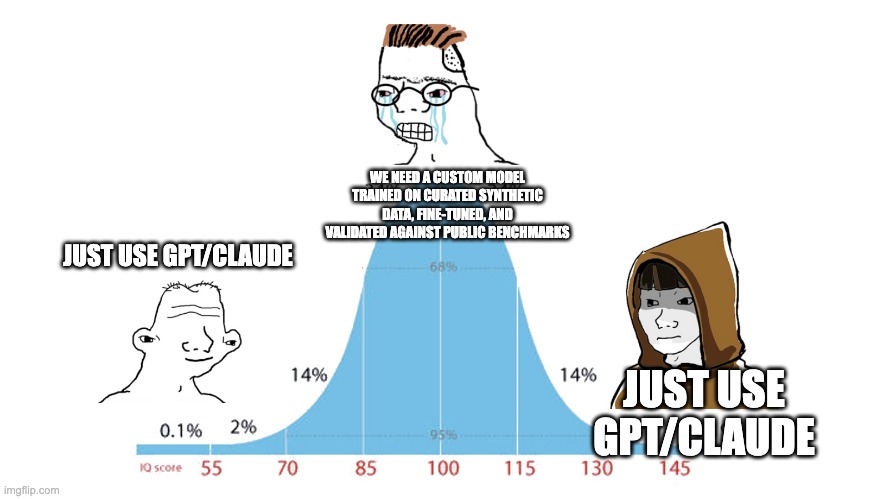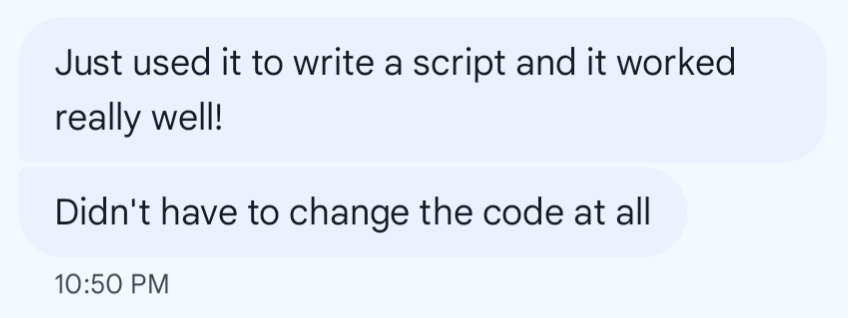
https://aigrant.com/
Here is my application (selected questions only):
Provide a short summary of your product
Better code generation than Cursor
Describe your product in more detail
Run manicode in your terminal. Ask it to do any coding task. It will make changes to your files.
...and it will do a really good job. Why?
It has full access to read and write to your files, run terminal commands, and scrape the web
It can: grab files it needs for context, edit multiple files at once (no copy-pasting), run the type checker, run tests, install dependencies, and search for documentation.
These abilities are key to doing a good job and will only become more powerful as LLM's continue to level up.
It uses so-called "knowledge" files
LLM's perform so much better with extra context!
With Manicode, we've come up with this idea to check in
knowledge.mdfiles in any directory, and write down extra bits of context, like which 3 files you need to edit in order to create a new endpoint. Or which patterns are being deprecated and which should be used. Or which directories can import from other directories.Every codebase has lots of implicit knowledge like this that you have to impart to your engineers. Once written down, it makes Claude really fly! It's truly a night and day difference.
It's synchronous, and you can give feedback
You're chatting with it. It takes ~30 seconds to get back to you and then you can tell it what you want to do next or what it did wrong.
This keeps Manicode on track and aligned.
It learns
The flow of using Manicode is:
Ask it to do something
If it fails, point out its error
Manicode fixes the error and automatically writes down how it can improve for next time in a knowledge file
You push the commit, and now Manicode has become even more capable when the next engineer runs it in the codebase.
This is the magic loop that will make Manicode productive for experienced engineers in giant codebases.
We're unafraid to spend for better results
We can use as many parallel API calls with as much context as we can to produce the best code, because we know that the alternative is human labor, which is much more expensive.
We're targeting the largest market for software engineers
It's a tool for daily use by experts (not just junior engineers)
It's for software maintainers (not just people starting new projects)
We're starting with a console application, because it's simple and has great distribution
Every developer knows how to install new packages with npm or pip.
Most developers already have the terminal accessible: as a pane in your vscode window, for example.
The timing is right
Claude Sonnet 3.5 passed some bar of coding competence, and the form factor of a fully capable agent that can change any file works now, whereas before you could only reliably edit one function at a time.
There is a moat after all
Handling every tech stack well, knowing when to run their tests and type check, integrating with git, linear, slack, and email, supporting database migrations, etc, etc, etc. You can build hundreds or thousands of special case prompt magic to improve things so that it always just magically works the first time. A startup arriving at this 6 months late wouldn't catch up.
Try it out!
> npm install -g manicode
> manicode
Intro video
Demo video
https://www.loom.com/share/2067e3ad5fdf4565905f6aeb8f13b215?sid=de0e9ad8-447a-485a-bcb3-71b8a5a43665
Addendum
I submitted this last night. The few things I forgot to include:
The prototype is communicating with my server over websockets and so is significantly more complex than running a local script. It is already set up to work on any project immediately.
I intend to charge $100 per month per user to get off the free plan (and some usage based fees after that if you use it a huge amount).
Giving
manicodefull access to your files and terminal where it can run stuff without confirmation from the user sounds scary, but is actually not risky in reality, especially if you have version control. This quality of doing something that normal people think "goes too far" or seems unsafe is a correlated with good startup ideas, because it means fewer people are likely to have thought of it. (E.g. For Airbnb: You let random strangers sleep in your house? Or Manifold: You let anyone ask and judge the resolution of their own question?)Aug 12: Another contrarian thesis I forgot to write is that I think it's likely that using the best LLM on the market (e.g. Sonnet 3.5) will continue to outperform any specially trained model or fine-tuned model.
The big LLM's train on a huge amount of code and have the largest budgets. Smaller but more specific coding models might sound fancier, but could well be a dead-end.
Empirically, the better the LLM's get, the more they can just take natural language instructions through context that are far, far more configurable and can be iterated upon quickly. I think these custom instructions, embodied in the knowledge-file approach of Manicode, will outpace custom trained models for the next several years. If you want to make that bet, bet on Manicode!
They said they will let us know if we won by September 20th at the latest.
🏅 Top traders
| # | Trader | Total profit |
|---|---|---|
| 1 | Ṁ55,854 | |
| 2 | Ṁ4,526 | |
| 3 | Ṁ2,360 | |
| 4 | Ṁ1,498 | |
| 5 | Ṁ1,239 |
People are also trading
@JohnTackman Not yet! We are experimenting with including o1.
I think the Manicode philosophy will be to ship the best thing we can for you, but with no configuration options.
@Conflux Would probably be a plus, I could email them! My feeling is that AI Grant is more competitive to get into than YC, so I don't know how much it would help.
good luck, i have been using cursor now for a while and wanted to understand what makes this tool better? are there extra features that are not offered by cursor? (i am extremely satisfied with cursor)
Yup, it will edit multiple files for you based on your request (and run terminal commands). It also applies edits right away, and you can undo it if you don't like them.
It's like Cursor's Composer feature (you can enable it in settings), except it chooses which files to include automatically.
When I use it on the manifold or manicode codebase, it will also read the knowledge.md files we've written which make it much better at coding in the patterns that we use.
sounds interesting, i imagine this is very useful for mature projects with big codebases where you treat the code assistant as an engineer. Would be cool if i can add it to my repo, assign it an issue then review the PR and even provide feedback (this ux would feel more natural to me if the assistant works like you describe)
Haha, yes. However, if you want to do quick iteration loops (and if your engineer is available 24/7 lol), then I do think it's easier when the code is modified locally. You then have the ability to tweak it or run it before committing.
I am aiming for large codebases and to help engineers with day-to-day work. But I also think right now it's even better for new projects, since there is just less context to load into Claude, and more often you are creating whole new files that are not dependent as that many other things.
The way i see it is that chatgpt, claude or even cursor are perfect for new projects because new projects are inherently easier to write code for. However, I do see value in your focus on supporting big projects with large code bases and giving the ai more "power". Anyways, I will try
manicode for both use-cases and report back in the upcoming weeks. I will also be rooting for you!
Cross posted from the Manicode Discord.
If you want to follow progress on Manicode, you should join!
Lots of new stuff for Manicode (v0.44)!
Overhauled console commands & help menu:
You can type "undo" to revert last changes. "help" to show commands. Help menu has more information
Startup is now instant with no lag
Added prompt caching for system prompt, file tree, and knowledge based on the beta API Anthropic just released (https://docs.anthropic.com/en/docs/build-with-claude/prompt-caching)
Made manicode much less likely to continue implementing needless changes you didn't ask for
Made manicode much less likely to forget to request files that it needs (was leading to awful hallucinated file diffs 🙀)
Websocket errors are not as noisy
Any changes you have when you send a new message to manicode are now automatically staged (with "git add ."). This allows you to see the diff of just the changes that manicode has made
Let me know if you have any feedback!
Substack announcement:
https://jamesgrugett.com/p/announcing-manicode-v0
Twitter announcement:
https://x.com/jahooma/status/1823497007526502788


